FORT POLK, La. -- Fort Polk's Medical Activity welcomed its newest group of leaders into the NCO Corps during an induction ceremony Aug. 12. In recognition of their accomplishment, and in keeping with 2009's Year of the NCO theme, "The Guardian" asked the newly promoted Soldiers a few questions.
Guardian: What does it mean to be an NCO'
Sgt. Evan Sanchez, squad leader, 565th Medical Company, 115th Combat Support Hospital:
I've been an NCO for a little more than a year. You have to be on top of your job, but you also need to train and mentor junior enlisted because they will eventually take your place when you move on.
Sgt. Clinton Nix, section sergeant, 565th Med Co:
NCOs have to be multi-purpose. They are mentors, trainers, medics and have additional duties. I'm a unit movement officer now. I'm learning to move our ambulances and equipment to the railhead or airport. We have to be able to wear as many hats as necessary.
Sgt. Julian MuAfA+-oz, squad leader, 565th Med Co:
NCOs are disciplinary figures and counselors at the same time. They have to take care of Soldiers and have the ability to learn from their leaders -- the good and bad.
Staff Sgt. Amanda Christopher, nurse:
NCOs have an administrative role. Now I'm high enough in rank that I'm in charge of something. As a first line supervisor, it's on me to mold the junior enlisted into future leaders, so they don't just stagnate. If I'm squared away but my Soldiers are not, I might as well not be either.
Sgt. Ewen Tesot, radiology:
I have more responsibility now as an NCO. I'm not just concerned with myself any longer, I have to worry about other Soldiers under me. Once a Soldier becomes an NCO they start to see the bigger picture.
Guardian: What NCO inspired you to step up and helped you become the NCO you are today'
Staff Sgt. Timothy Alexander, section sergeant, 565th Med Co:
I try to take the best from all of the NCOs I've seen. I use their techniques and build on them.
Sanchez:
When I joined the Army I already had some life experience, and my first squad leader, Sergeant Thyrone Jones, saw that I could handle responsibility. He always challenged me and showed me the ropes and how to be an NCO -- not just how to do the job, but the ins and outs of leading and training other people.
Sgt. Robert Van Ausdall, team leader, 565th Med Co:
Sergeant Neal Henry was my first squad leader. He was a big, loud guy and always made a name for himself. He pushed me to constantly do a little bit more. He showed me that you can't just sit in the background and expect everything to happen for you, you have to go make it happen.
Nix:
I've had several good mentors. Sergeant First Class Elizabeth Cimaglio taught me to really look at my Soldiers and learn about them. I don't believe there is a bad Soldier out there -- there are just some Soldiers we have to pay more attention to so we can find out which direction they need to go and what is keeping them from being what they want to be.
MuAfA+-oz:
I learned from all of my NCOs. The key to leadership is not only learning what to do, but also what not to do. That's the most important thing I've learned. I ask myself, "what can I do to make things better'"
Christopher:
My supervisor in Iraq influenced me a lot -- he was a little hard on me. I don't know if he saw my potential or if he was just trying to get me up to par. There were times when I thought he was being too tough, but looking back, I'm thankful for it.
Tesot:
First Sergeant Luke Alphonso was my first sergeant when I got here. What set him apart from a lot of NCOs is the way he set the standard. He was high speed. If he asked you to do something you could be sure he could do it 10 times better than you. If you did something good he would compliment you. If you did something wrong though, it didn't matter what your rank was, he would tear you up right there. But the next day he wouldn't hold it against you. He would square you away, you'd take care of it and it would be over with.
Guardian: How is being an NCO in the Medical Corps different than in the rest of the Army'
Alexander:
In the hospital we only deal with medics, but they are all over the place. An infantry unit is always in the same place -- they work, train and live together. For us, it's different. We do things on our own. In my current unit we send ambulances out with two medics. As an NCO you learn to manage your people from a distance. The Soldiers have to be self-sufficient. NCOs across the Army take care of Soldiers and the people who work for them. Medical NCOs take care of patients, too. We work to keep people alive.
Sanchez:
Sometimes it's harder for medical Soldiers to understand the value of teamwork and reliance on the Soldier to your right and left, because our tasks are individual tasks.
Van Ausdall:
Being a medical NCO is difficult because medicine is always changing. We get trained to do one thing during initial training, and by the time we get a few Soldiers underneath us the requirements change or have been altered. We always have to stay up to date on what's changing.
Nix:
Medical NCOs have to sign for expensive equipment, which usually isn't stationary. When I was a private, I was only signed for a $200 aid bag. As an NCO I had four ambulances worth $250,000. At my next assignment I ran the second largest audiology clinic in the Army at Fort Lewis, Wash. I signed for $750,000 worth of equipment. We not only have to keep up with our medical skills and Soldier management skills, we have to learn a whole new skill set on how to keep track of this equipment.
Guardian: What do you find the most rewarding about your job'
Sanchez:
Seeing my Soldiers succeed and realizing I played a part in that. You can either push them to do better, and they listen and take the advice, or not. When my Soldiers come to me with a goal, believing I can help them reach that goal, I recognize how much influence I have. It makes me want to be a better Soldier and individual, so I have more to offer.
Van Ausdall:
I was the sponsor for one of the Soldiers in my unit when he first arrived. I showed him around post and how our unit worked. He is in flight medic school right now. Now he's moving on to bigger things and I've been a stepping stone for him. It makes me feel good that I was part of making that happen.
Nix:
When I was a specialist and made the list for sergeant, I inspired a fellow Soldier to earn promotion points. He spent block leave working on correspondence courses. I had the privilege of pinning him with E-5. He almost had an associate's degree in six months, because he applied himself. He has already passed me in rank. It made me feel good to teach somebody something. I can say I made a difference in that Soldier's life.
MuAfA+-oz:
This has been one of the hardest years for me in the military. The only thing that's gotten me through is my Soldiers. My Soldiers tell me the reason they work so hard is that they know I'm going to be there for them and back them up. I give them the credit for my success here at Fort Polk.
Tesot:
For me, the greatest satisfaction comes from making a difference in peoples' lives.
Cpl. Austin Labiche, lab technician, MEDDAC:
While I was attending an Army school I took another Soldier under my wing. I did it because I was told to at first, but I ended up helping her develop Soldier skills and even work through some personal issues. When we graduated she thanked me for helping her.
MEDDAC inducted the following NCOs Aug. 12:
MEDDAC
Staff Sgt. Amanda Christopher, Staff Sgt. Renee Grippon, Staff Sgt. David Hanks, Sgt. Desiree Dennull, Sgt. Michael Llanas, Sgt. Ewen Tesot, Cpl. Austin Labiche.
DENTAC
Sgt. Adrianne Gilmore, Sgt. Robyn Hagglund.
115th CSH
Staff Sgt. Timothy Alexander, Sgt. Davon Childress, Sgt. Julian MuAfA+-oz, Sgt. Clinton Nix, Sgt. Evan Sanchez, Sgt. Robert Van Ausdall, Sgt. Janagen Williams.
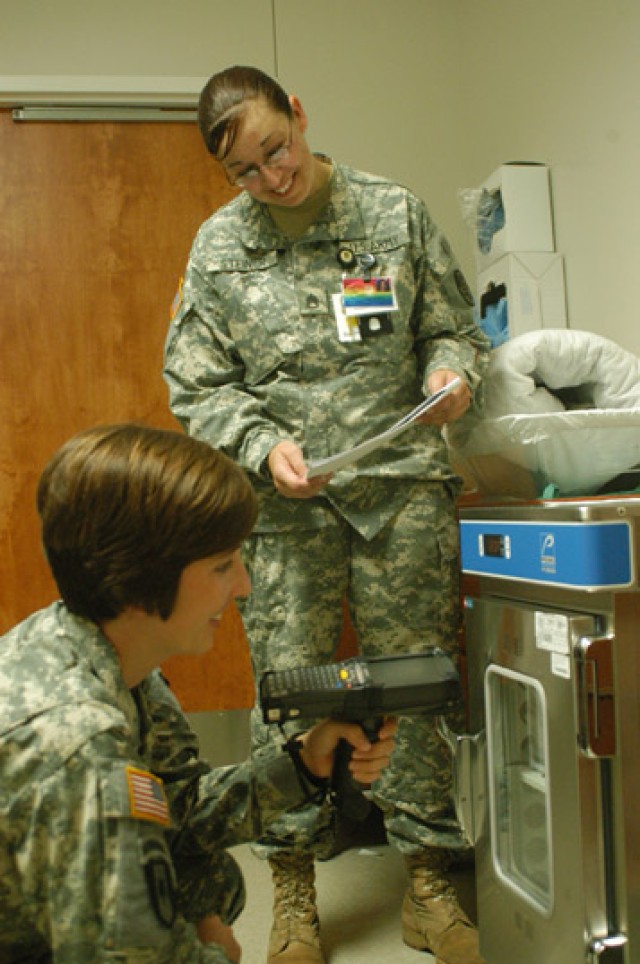
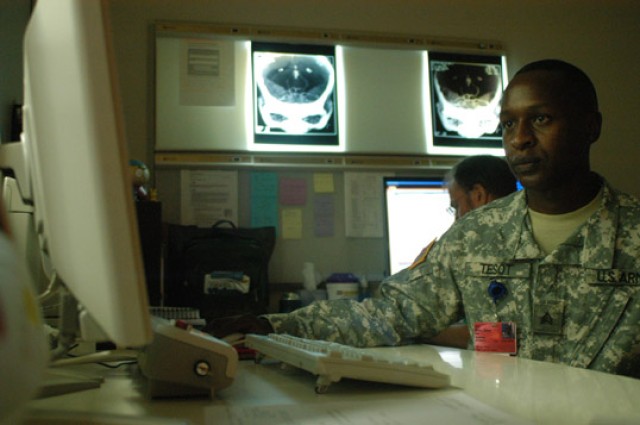
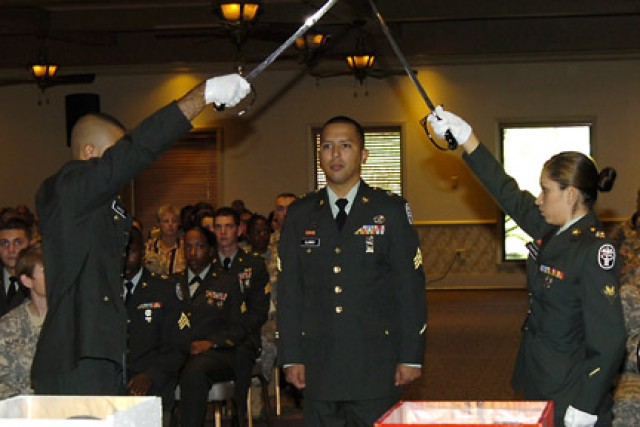

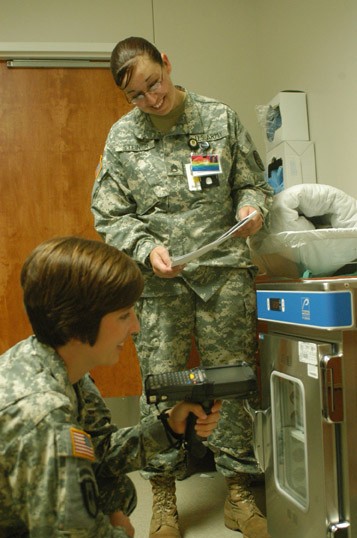
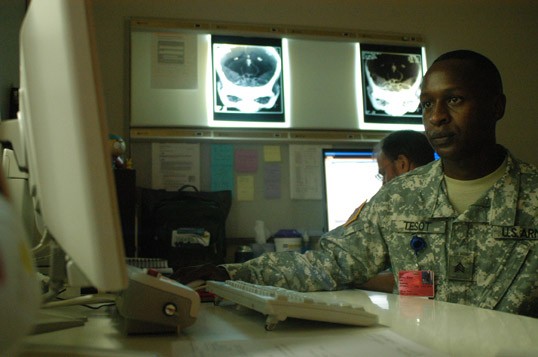
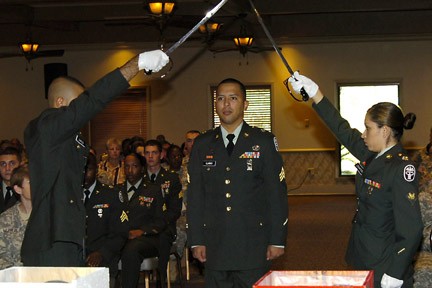
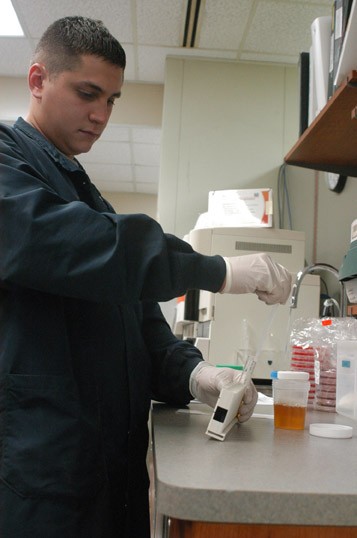
Social Sharing